The biggest problem with leads is that it’s so easy to lose them.
46% of sales inquiries are classified as missed opportunities. That’s almost half of the potential revenue going down the drain.
To avoid it, you need reliable software to automate and improve lead distribution processes in your sales team.
In this article, you learn everything about lead distribution software and tools, including the 7 best solutions for you to start implementing now.
What is lead distribution software?
Lead distribution software is a tool designed to seamlessly integrate the point of entry for new sales leads with the platforms where sales representatives actively manage their workflows.
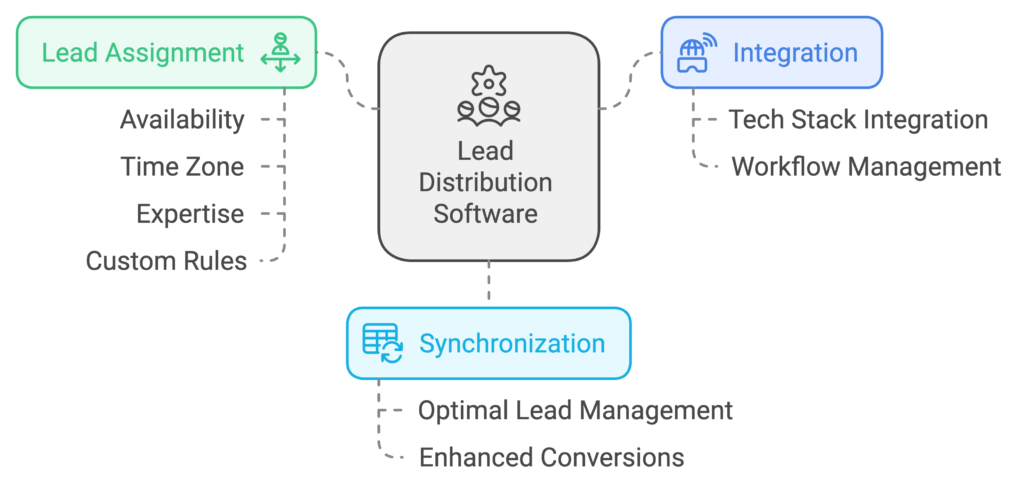
It efficiently assigns incoming leads to the most suitable representatives based on various factors such as availability, time zone, expertise, and other customized rules.
This software ensures smooth synchronization with your existing tech stack, facilitating optimal lead management and routing that enhances the potential for successful conversions.
7 Best lead distribution software and tools to boost sales in 2025
1. LeadAssign (Bluebird) is the best hybrid lead distribution software
LeadAssign, which has recently changed its name to Bluebird, is a lead distribution software that uses AI to enhance how leads are allotted to sales reps.
Specifically designed for enterprise businesses with extensive, dispersed sales teams, this platform learns and improves over time to efficiently match the right leads with the most suitable reps.
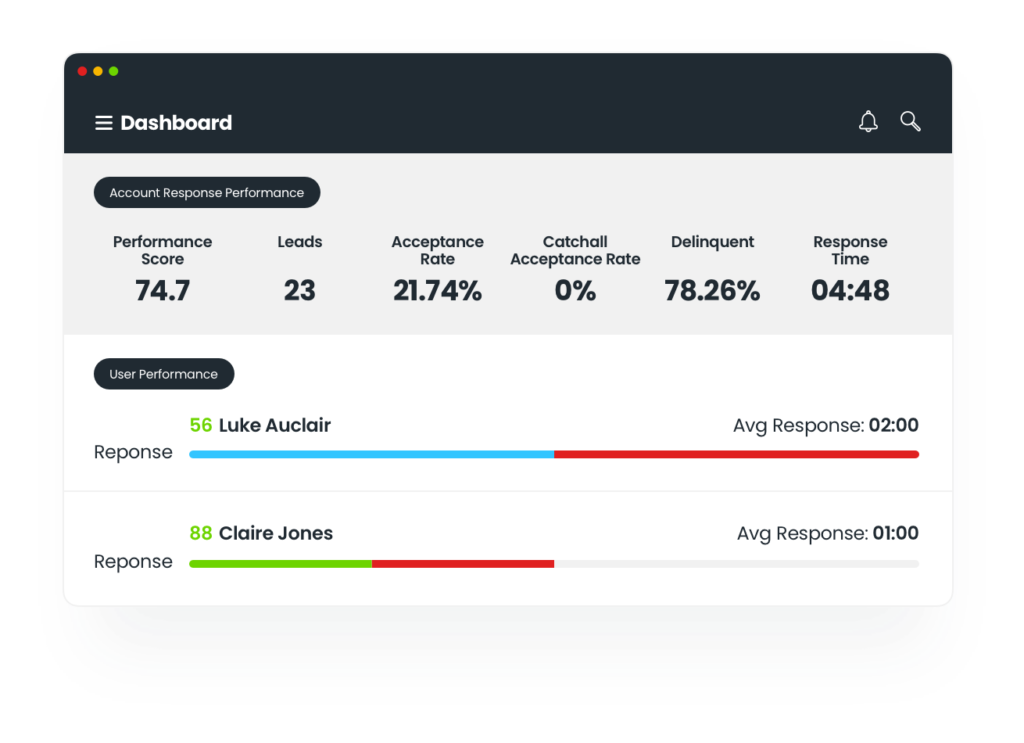
A standout feature of LeadAssign is its system of incentivizing quick responses: when a lead is assigned to a representative, they have a limited timeframe to accept it.
If they fail to do so promptly, the lead is then rerouted to another rep or made available to the team. It’s a dynamic approach that can help you to achieve faster response rates and optimize lead distribution.
Rating: G2 – 4.5/5 ⭐⭐⭐⭐⭐
Key features:
- AI routing
- Parsing and scoring engine matches lead contents to sales roster profiles
- Leads are offered to matched sales reps via the tools they use
- Lead opportunity windows that enable sales reps to accept leads rather than being assigned to them
- Automated conversion capture
- Real-time data on lead status, program, and partner performance
Integrations: Salesforce, HubSpot, Oracle, Microsoft Dynamics
Free trial: No
Pricing:
Base plan – $600/per month (with annual contract)for 20 seats and up to 1,200 leads per year
Custom plan – available upon request
2. Power Router is the best software for MQL-based lead routing workflows
Power Router is an excellent lead routing software for sales teams that have chosen Salesforce as their CRM.
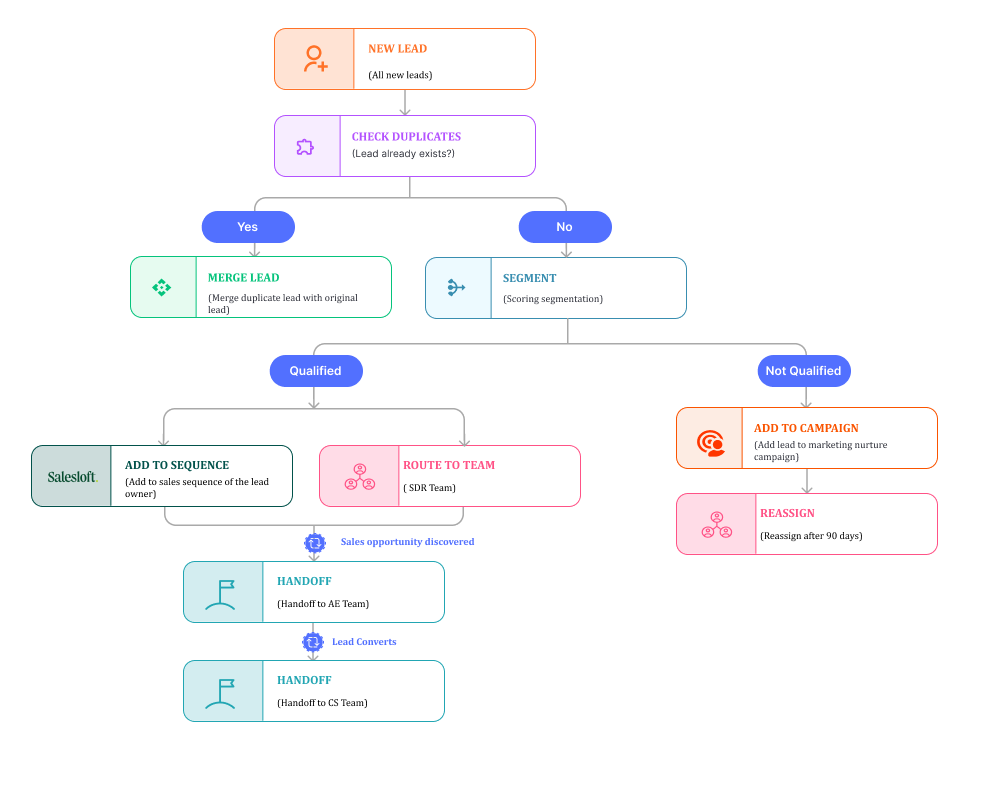
With this tool, sales reps get a limited amount of time to accept the new lead before it gets rerouted to another sales rep. This increases the efficiency and speed of the workflow.
Moreover, Power Router has a drag-and-drop feature that allows you to build your own lead routing logic that adapts to your lead distribution plan.
Key features:
- Instant lead to account matching
- Customizable complex workflows
- Drag-and-drop logic builder for lead routing
- Assigning high-potential MQLs as a priority
- Round-robin and random lead distribution
Integrations: native Salesforce integration
Free trial: No
Pricing:
Starter Plan – $15/user per month (billed annually)
Growth Plan – $25/user per month (billed annually)
Enterprise Plan – $35/user per month (billed annually)
3. LeadAngel is the best all-rounder lead distribution software
LeadAngel is lead distribution software that offers useful features like round-robin, weighted, and segmented distribution.

LeadAngel also has account-based assignments where new contacts from an existing account will automatically get directed to the rep in charge of that account. That’s a great time-saving feature for fast routing.
Rating: G2 – 4.5/5 ⭐⭐⭐⭐⭐
Key features:
- Automatic account distribution to the correct rep
- Automated and segmented lead routing
- Data cleanup automatically fixes duplications
- Accurate lead to account matching
- Real-time lead routing and native calendar integration
Integrations: Salesforce, Oracle, HubSpot, Microsoft Dynamics
Free trial: The first 6 months are free when billed annually
Pricing:
Lite Plan – $99 per company/month (when billed annually)
Custom Plan – available upon request
4. LeadSquared is the best lead management system for large customer-facing teams
LeadSquared is a lead distribution software tailored primarily for businesses with high-volume sales needs, such as EdTech, HealthTech, financial services, and other B2C sectors.
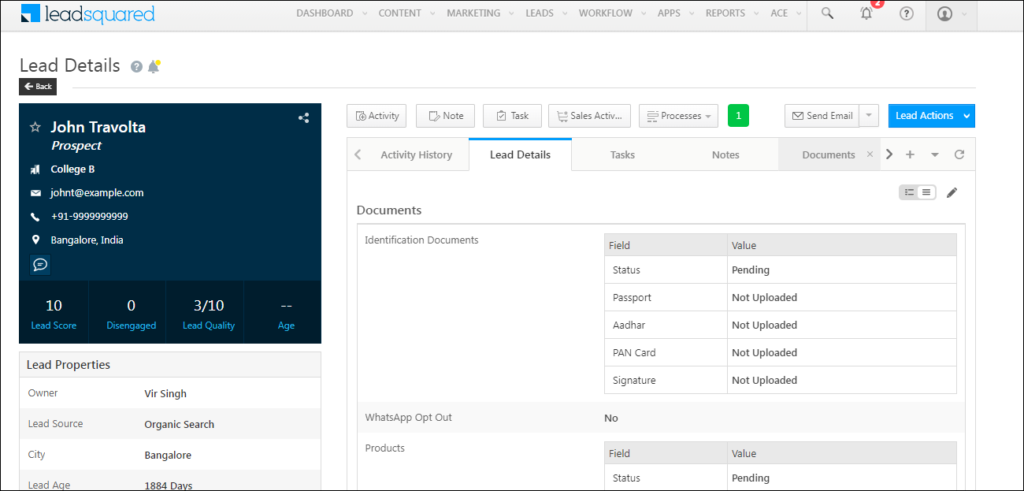
It is engineered to support large customer-facing teams, offering specialized features for seamless routing of both new leads and existing customers to the appropriate team member or agent.
LeadSquared has a localization feature, which is designed to efficiently assign new leads to field sales representatives located nearby, enhancing the relevance and promptness of interactions.
Additionally, the platform incorporates a built-in mobile CRM, making it particularly advantageous for field sales reps and agents who need to manage their sales activities on the go.
Rating: G2 – 4.6/5 ⭐⭐⭐⭐⭐
Key features:
- A hyper-localized lead distribution for field sales teams with a high volume of inbound leads
- Auto-qualify leads based on pre-defined rules
- Lead distribution based on dynamic criteria
- Lead capture automation from various sources with zero leakage
- Round-robin and random lead distribution
Integrations: Salesforce, Microsoft Dynamics, Zendesk, Unbounce, Shopify + built-in mobile CRM
Free trial: No
Pricing: Not disclosed publicly
5. LeanData is the best software to manage and distribute Salesforce lead data
LeanData is a specialized lead management software that integrates natively with Salesforce to enhance the utilization of Salesforce lead data.
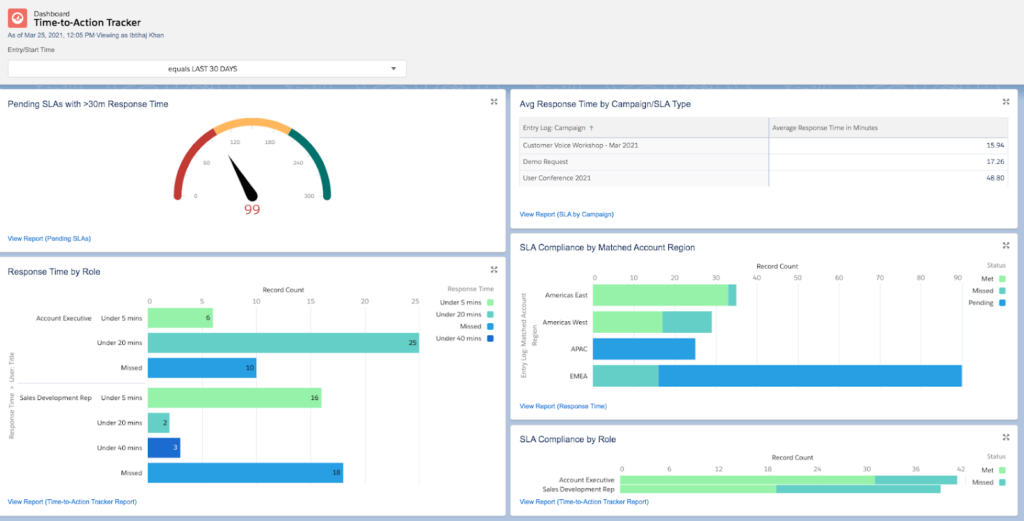
What sets LeanData apart is its ability to create automated workflows for efficient lead routing, precise lead-to-account matching, and effective Account-Based Marketing (ABM) engagement.
The platform features a user-friendly drag-and-drop interface that allows users to customize specific routing protocols easily.
A significant feature of LeanData is its ability to maintain data integrity; it automatically verifies incoming leads against existing accounts in the CRM to prevent duplicates.
If a match is found, the lead is seamlessly converted into a contact and linked to the corresponding account, ensuring the data remains organized and up-to-date.
Rating: G2 – 4.6/5 ⭐⭐⭐⭐⭐
Key features:
- Flexible lead matching and routing that allow to capture, cleanse, enrich, connect, and deliver data from multiple sources into Salesforce
- Buying Groups feature for building opportunity-centric GTM strategy
- GTM process automation and multi-layer orchestration
- Native Salesforce data app
- Intuitive and flexible lead distribution
- Salesforce deduplication and data cleansing
Integrations: Salesforce, Gong, Salesloft, Outreach, Clearbit, 6sense, Cognisn and others.
Free trial: No
Pricing:
Standard plan – $39 USD per user license/month
Advanced plan – $49 USD per user license/month
Premium plan – $59 USD per user license/month
Enterprise plan – custom price upon request
6. Chili Piper has the best lead routing tool, Distro, for more complex routing
Chili Piper offers robust lead distribution solutions through its specialized tools — Distro and Instant Booker. They are built for sales teams that seek efficient inbound automation.
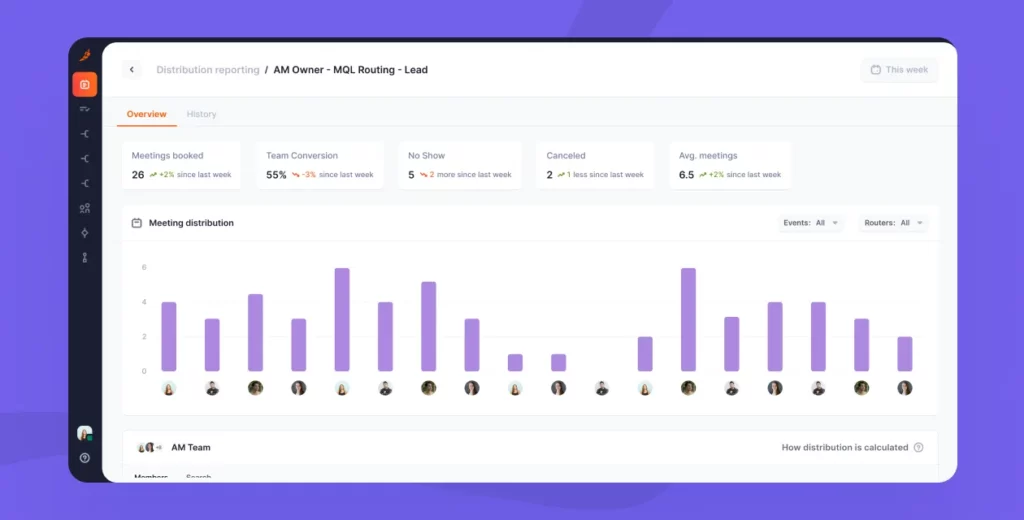
Distro, the primary lead distribution feature, allows full customization where leads are distributed based on very specific details such as industry focus, location, or deal size.
The Instant Booker is another tool offered by Chili Piper. It automates the scheduling process, enabling Sales Development Representatives (SDRs) to smoothly transition leads to the appropriate Account Executives (AEs) by scheduling handoff meetings directly.
7. Pipedrive is the best CRM software with lead distribution capabilities
Pipedrive is built to streamline lead and deal management for sales teams by focusing your efforts on top-priority leads.
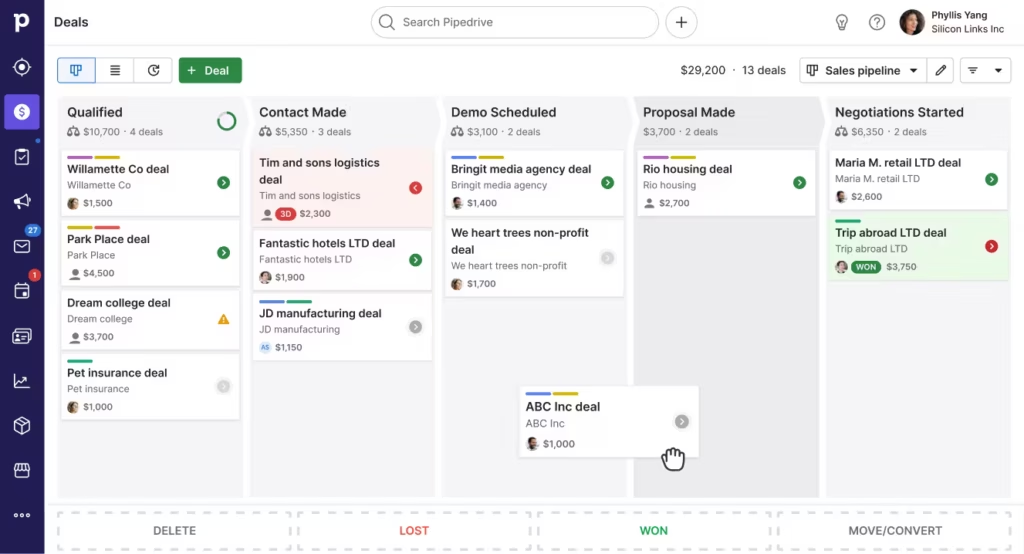
It offers visual pipeline management, email integration, AI sales assistance, and comprehensive sales reporting and forecasting.
Pipedrive’s lead management system methodically organizes leads in a Leads Inbox. This clear structuring helps teams concentrate on critical deals first, which enhances productivity.
Its automated lead distribution capability is particularly impressive, as it assigns team members leads based on predefined criteria like deal value or urgency.
Rating: 4.3/5 ⭐⭐⭐⭐
Key Features:
- Customizable rules for assigning leads to the right sales reps
- Acts as a single source of truth for lead and deal management
- Follow up on leads directly from the CRM
- Automatic prompts for tasks for closing leads
Integrations: Zapier, Xero, Quickbooks, QuarterOne, and many more
Free trial: Yes, 14 days
Pricing:
Essential plan – €24/seat per month (billed monthly)
Advanced plan: €44/seat per month (billed monthly)
Professional plan: €64/seat per month (billed monthly)
Power plan: €79/seat per month (billed monthly)
Enterprise: €129/seat per month (billed monthly)
5 Other Sales Tools With Lead Distribution Features
Not all software is dedicated to lead distribution software, but there is quite a wide variety of sales platforms and tools made for lead management and distribution.
We recommend you try out:
- Zapier – it is a great tool for linking your lead generation software with CRM to distribute leads to your sales reps
- Salesforce – it has a natively integrated lead system in which you can create coded lead assignment rules for every lead type. If you’re a Salesforce suite user, you may want to give it a try.
- Insightly – it has a built-in CRM where you can find a lead assignment rule builder (only available on higher tier plans).
- Close CRM – it is a CRM that offers Smart Views to create lead lists for your reps. You can also use it with Zapier for round-robin and random lead assignments.
- lemlist – it is a sales engagement platform that offers powerful lead generation and lead management features, including:
- Unified inbox for all lead communications,
- Email Finder and Verifier,
- 450M+ lead contact database of potential buyers,
- Advanced conditions for outreach campaigns where you can tailor your campaign depending on how lead interacts with you,
- Robust automations,
- Personalized emails at a large scale.
What are the benefits of using lead distribution software?
- Enhanced Speed and Efficiency: Automates the distribution of leads, ensuring that they are assigned to the appropriate sales representatives swiftly, reducing response times and increasing the likelihood of conversion.
- Improved Matching: Tailors the assignment of leads based on specific criteria such as rep expertise, geographic location, and availability, ensuring leads are handled by the most qualified personnel.
- Increased Productivity: Frees up time for sales reps by automating the lead assignment process, allowing them to focus more on selling than on administrative tasks involved in lead management.
- Better Data Integration: Seamlessly syncs with existing CRM and other sales tools in the tech stack, maintaining data consistency and providing a unified view of lead information for more informed decision-making.
- Scalability: Easily adjusts to changes in lead volume and business growth without requiring significant additional resources, supporting scalable and efficient lead management operations.
Are there any cons of lead distribution software?
- Learning Curve: Implementing lead distribution software can be complex, requiring careful planning and training. The initial setup and customization to match your specific business rules and processes can be time-consuming, and there may be a learning curve for staff to effectively utilize the new system.
- Costs: Depending on the sophistication of the software, costs can be significant, especially for small businesses. This includes not just the initial purchase price, but also ongoing costs for maintenance, updates, and potentially higher-tier plans as your lead volume or team size increases.
- Over-Reliance on Automation: While automating lead distribution can increase efficiency, an over-reliance on automation may lead to a lack of personal touch in handling leads. This could potentially impact client relationships, especially in industries where personalized interaction is crucial.
- Integration Issues: If not compatible with existing tools and systems (CRM, sales platforms, etc.), lead distribution software can lead to integration issues, resulting in data silos or inaccuracies. This could complicate workflows rather than streamline them.

